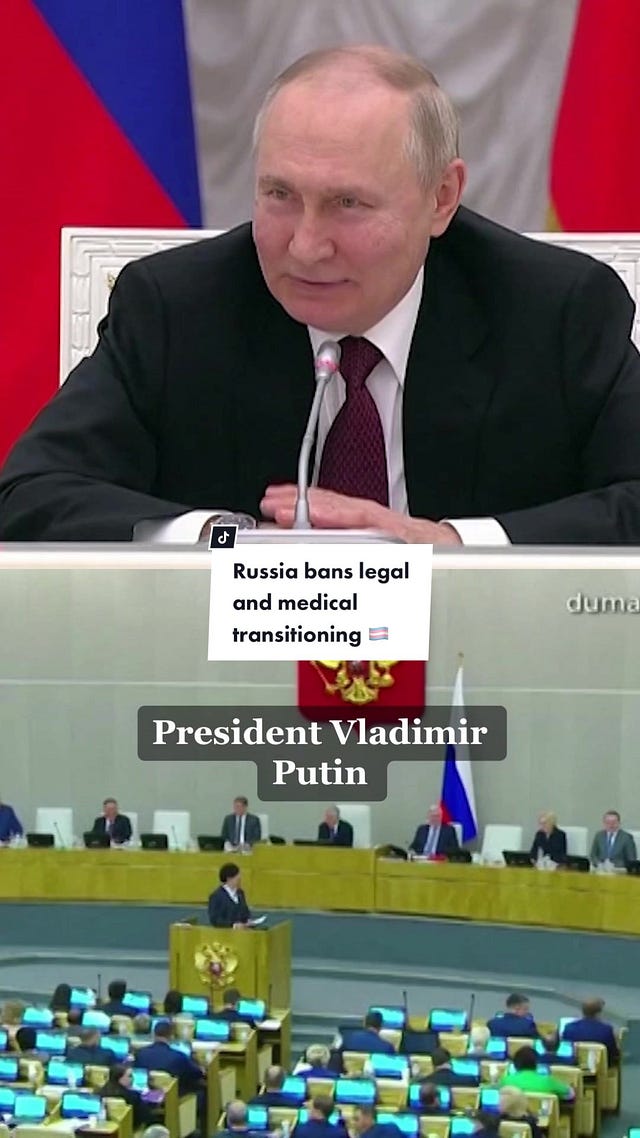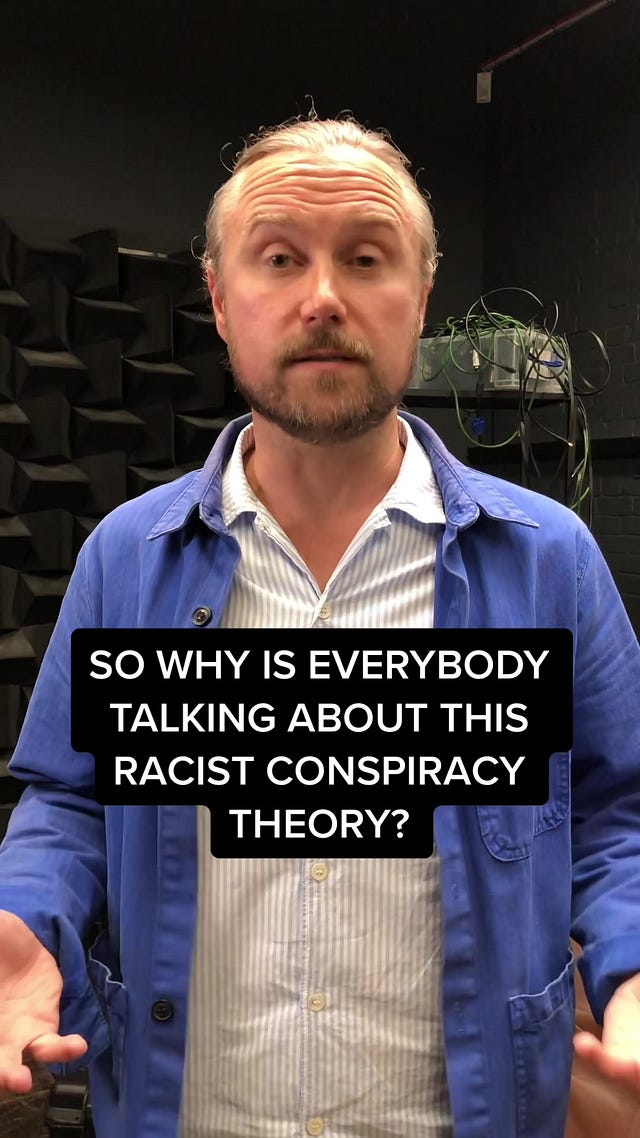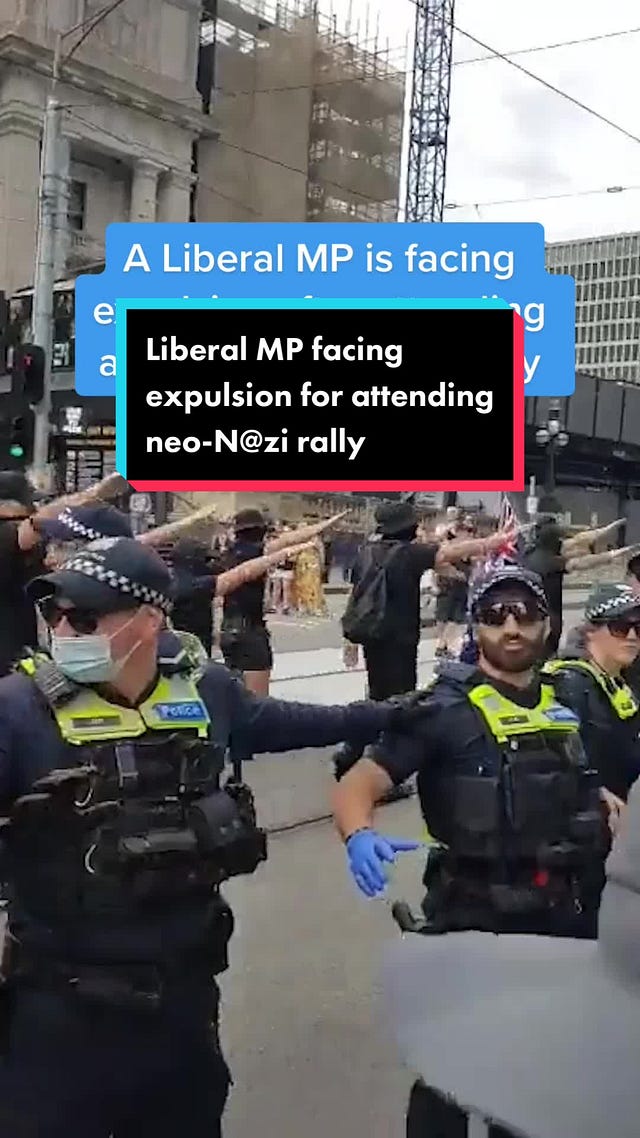How Autocracy Uses Transphobia to Justify Itself
Vladimir Putin, Judith Butler, and the promise of transgender politics
As an American trans activist, reading about the unfolding fate of Russian queers fills me with an uncanny disease. Over the past decade, the government of Vladimir Putin has gradually tightened the vice on their most fundamental freedoms, escalating from censorship of “gay propaganda” (ostensibly to protect children) to a societal-wide repression of any online or offline mention of queer and trans life. LGBTQ rights organizations have been largely decimated, with the country’s equivalent of the Human Rights Campaign forcibly shut down in 2022 and “the LGBT movement” declared an “extremist” and “terrorist” movement by the country’s Supreme Court. All gender-affirming medical care has been banned for transgender Russians of any age who have also been banned from adopting children and had their existing marriages nullified. Raids of gay bars and clubs have led to mass arrests, and anyone from librarians to artists who attempt to stand in solidarity with queer Russians are either arrested or forced to flee. “People are emigrating urgently,” one openly-gay politician in St. Petersburg told the BBC. “The actual word we're using is evacuation.”
This has extended to the actions of Russian troops in Ukraine which have targeted gay civilians with arrest, violence, and public humiliation. Putin himself has portrayed queer life as a foreign Western import and its repression as a matter of national security, announcing his 2022 invasion of Ukraine as a campaign against “the attitudes they have been aggressively imposing on their countries, attitudes that are directly leading to degradation and degeneration, because they are contrary to human nature.”

 Tiktok failed to load.
Tiktok failed to load.Enable 3rd party cookies or use another browser
As the philosopher Judith Butler writes in their new book, Putin is far from alone. In Who’s Afraid of Gender? the famed theorist details the many forces around the globe waging an “anti-gender” campaign paradoxically aimed at enforcing rigidly-patriarchal gender norms, portraying “gender ideology” as an amorphous contagion taking the shape of feminists, reproductive rights, gay marriage, or the existence of transgender people altogether. These ideologues, write Butler, justify ever more surveillance and repression as the pursuit of “a patriarchal dream-order where a father is a father; a sexed identity never changes; women, conceived as ‘born female at birth,’ resume their natural and ‘moral’ positions within the household; and white people hold uncontested racial supremacy.”
Butler frequently describes this international effort—led by strongman authoritarians, American Evangelicals, Vatican moralists, and politicians from Russia to Brazil to Florida—as succumbing to a “psychosocial” fantasy, a “phantasm” that would-be and actual authoritarians can use to justify further policing and domination. As others have noted, watching Butler shadowbox the fabricated and contradictory mythologies undergirding the “anti-gender” movement can be cathartic but a bit disappointing; reading the book is like watching a skilled Chessmaster put a toddler in checkmate. But given the tyrannical toddler in this metaphor seems to be besting even ostensibly liberal figures like writers at The New York Times, the book is also a necessary intervention.
The gender regimes being “defended” from “degeneracy” by Putin are, first and foremost, ways of organizing and exploiting reproduction. “Gender is not just a matter of individual liberty,” writes Butler, “but a category that describes the division of labor, the organization of states, the unequal distribution of power.” Far from merely a “culture war,” anti-gender panics are not only hegemonic and rhetorical but material and literal, closing down any life path that leads away from their demand for more reproductive sex and away from ways of being instead focused on freedom, a closing of possibilities in the name of creating more of the “right” babies and fewer of the “wrong” ones.
To stick with the Russian example, Putin and his government often cite the need for “human capital” in the face of international threats as reason enough to subjugate queer life. As the scholar Emil Edenborg notes, the national security doctrine published by Putin six months before his 2022 invasion of Ukraine suggests “special attention is devoted to supporting the family, motherhood, fatherhood and childhood . . . children’s upbringing and their overall spiritual, moral, intellectual and physical development. . . . Higher birthrates are necessary in order to increase the population of Russia.“ When shuttering the country’s largest queer NGO, Russia’s Justice Ministry claimed “all the activities of Sphere run contrary to the state policy designed to preserve, expand and develop [the country’s] human capital.”
Indeed, Russia’s escalating war on LGBTQ rights has been paired with efforts to effectively shut down abortion access across the country where abortion providers are urged by Russian officials to “do their part to improve the demographic situation.” Russia has even drafted language for doctors to read to patients seeking abortions portraying pregnancy as “a beautiful and natural condition for every woman” and abortion as “harmful to your health and a risk of developing complications.” These demographic fears are not coincidentally parallel to rising xenophobia and prominence of an ultra-nationalist politics calling for “Russia for Russians” (a racist campaign that will surely escalate if reports that a branch of the Islamic State carried out this week’s terror attack on a Russian theater are confirmed).
This will all likely sound familiar to audiences in the United States, where politicians and ideologues from the far-right to the neoliberal have embraced a similar cocktail of reproductive coercion and xenophobic fears of outsiders to stave off “demographic collapse.” Far from a Russiagate-style conspiracy, the shared rhetoric and policymaking between Putin (or other international strongmen like Hungary’s Viktor Orban, Brazil’s Jair Bolsonaro, or Turkey’s Recep Erdoğan) and American conservatives are simply the logic of nationalism at work.
In 2013, Russia’s anti-gender campaign first caught the eye of an international audience when Putin signed his own “Don’t Say Gay” law less than year before hosting the Sochi Winter Olympics. The Russian journalist Masha Gessen fled the country with their partner and children, fearing they would lose custody or worse. As Gessen wrote at the time, the outpouring of liberal support for Russian queers was driven by both solidarity and self-interest:
It is the spectacle of history shifting abruptly into reverse. The current generation of Russians, though few of them are publicly out, had constructed comfortable lives in which they were open to their social circles. When your doctor and neighbours and child's schoolteachers know you are gay, there is no closet for you to hide in. That makes the tragedy of Russian LGBT people easy for western gays to identify with. This could be their story, too.
As Butler notes, leaders like Putin—or, for that matter, Donald Trump and Ron DeSantis—who warn of the calamitous power of “gender” are simply trying to obscure the power they themselves wish to wield against individual agency and bodily autonomy:
They are not opposed to gender—they have a precise gender order in mind that they want to impose upon the world. They seek to restore and consolidate a patriarchal dream of settled and hierarchical gender binaries, an order that can be achieved only by destroying the lives of others—or trying to. Destruction, paradoxically, thus becomes the condition of possibility of a patriarchal sexual and gender order that seeks to ward off the prospect of gender's ""destructive" power. Rather than warding off destruction, the anti-gender ideology movement is dedicated to making an ever-more-destructive world.
For the nationalist, those “settled and hierarchical binaries” that make up patriarchal gender roles are inseparable from the “settled and hierarchical binaries” that make up their racist worldview. Both the transsexual and the migrant loom large as agents of chaos and threats to the desired order because their own agency challenges those hierarchies and threatens to reveal those binaries as artifice. It is not merely a small minority of sexual deviants the anti-gender authoritarian hopes to control, but anyone who strays from a eugenic reproductive regime that lies at the heart of nationalist philosophy, colonial supremacy, and the logic of capitalism.
In perhaps Butler’s most salient theme across Who’s Afraid of Gender, the destructive power of these systems waging a war on gendered deviance is displaced onto gender itself. “The authoritarian who seeks to stoke fascist passions knows too well that the fear of destruction already courses through those who have seen the destruction of the climate, the environment, labor unions, and prospects for financial security,” writes Butler. The fostering of precarity and vulnerability among the broader populace is a fertile ground for scapegoating the strange, the other, the queer, the free. Far from just a distraction, however, it is a destructive campaign in its own right—further creating vulnerability and further justifying yet more destruction.
Butler makes clear the aim for this book is not to reach the most hardened of anti-gender activists. In fact, Butler begins the book with an appeal to reading itself as a “precondition for democratic life” to which the most extreme anti-gender activists seem actively allergic, banning books and the entire field of gender studies under the false belief it represents a “dogma” rather than a diverse field of active academic debate. “To be gender critical is thus a misnomer,” writes Butler, not only because activists who carry such a banner are enforcing their own gender ideology but because “they misunderstand what a ‘critical’ position entails.”
The apparent aim of their book, then, is to help liberals—many of whom have either stayed on the sidelines in campaigns targeting transgender people or actively cheered them on—realize the fascist tendencies at the heart of these attacks. As I wrote last week, liberal commentators have seemed bizarrely tolerant of revanchist assaults on sacrosanct liberal values like freedom of expression and personal autonomy when those attacks are waged in defense of essentialist liberal identity categories. Trans people are a very difficult subject to fold into those essentialist categories because, even at our most pathologized, our perspective and ways of being uproot the supposed logic of those categories. Indeed, the very idea gender is an “assigned” category threatens not only liberal notions of gender but liberal notions of identity altogether, starting as they do from a position any deviance from a white, heterosexual, cisgender norm is an “innate” fault from which select groups protected by civil rights law can be excused.
From this perspective, the gendered dynamics of Putin’s regime and imperialism are not a foundational piece of the entire project but simply another layer on the threat to the liberal international order. This faulty logic has its trans-inclusive versions, allowing some to ignore the contradictions of, say, liberal LGBTQ activists celebrating a Congressional budget deal that includes the enhanced militarization of our border because it also funds sex changes. But the very premise of transgender life, properly understood, is in opposition to the siloing of issues and “elite capture” of identity politics.
“Gender politics is not rightly described as "identity” politics if its ultimate goal is to create the world in which we all want to live,” writes Butler in the book’s conclusion. “It is by virtue of our interdependency that we stand a chance of surviving and flourishing.” That notion of interdependency is a threat to revanchist projects the world over that thrive on alienation, isolation, and a fearful state of enforced loneliness. Whether it’s to Putin or Trump or the empty-headed ideologues that undergird them, transgender people are disruptive precisely because our existence betrays that interconnectedness, emphasizing not only how we all shape ourselves but how we all shape each other.



"That notion of interdependency is a threat to revanchist projects the world over that thrive on alienation, isolation, and a fearful state of enforced loneliness....transgender people are disruptive precisely because our existence betrays [and affirms our] interconnectedness, emphasizing not only how we all shape ourselves but how we all shape each other." Thank you, Gillian!
I'm in tears over all of this. I can't thank you enough for writing so eloquently about Butler's work and what's happening overseas. I feel like screaming to get folks to listen to this, and yet I know my voice isn't nearly loud enough.